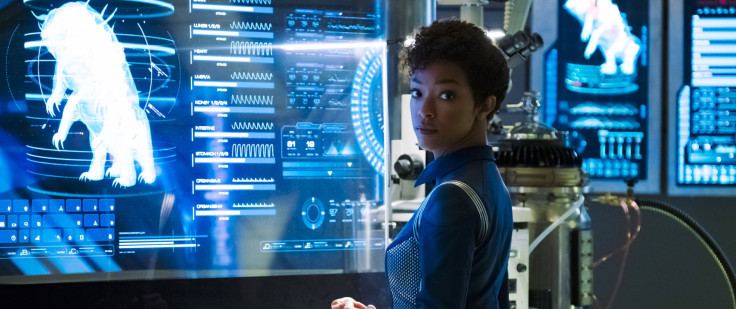The latest Star Trek: Discovery episode, “The Butcher’s Knife Cares Not for the Lamb’s Cry,” sounds like a lost Lucio Fulci giallo, but that’s one of the few good things to say about it. It doesn’t help that the cold open is monumentally compelling, but leads only to poorly written interactions and a major character death that deserves all the infamy of Tasha Yar’s end in The Next Generation episode “Skin of Evil.”
A peculiar and wonderful opening shot — crystalline structures grow together, fueled by clouds of lightning, to be revealed as the workings of a replicator producing Michael Burnham’s new Starfleet uniform (“Rank: none”) — illustrates the scientific miracles underlying even mundane activities. Change, violence and chaos is fundamental to the processes underlying the replicators Star Trek has treated like microwave ovens for 50 years. Compared to rest of the episode, this is as subtle and endearingly sci-fi as Discovery gets.
Burnham (Sonequa Martin-Green) heads to the bridge, where we witness Captain Gabriel Lorca (Jason Isaacs) lead a combat drill. It’s surprisingly thrilling, capturing the chaos of multiple voices, conflicting inputs and snap decisions. Lorca lays out the stakes: once the spore drive works, the Discovery will be uniquely able to appear anywhere in the universe, making them the perfect surgical strike force… if they can survive any situation, knowing backup will never come.
Lorca walks Burnham to his trophy room and reiterates one of the thematic tensions in this Star Trek: the conflict between the crew’s explorer ethos and the more military mindset Lorca would have them adopt to fight the Klingons. “These are some of the deadliest weapons in the galaxy,” Burnham says, surveying Lorca’s cabinet of curiosities.
“I study war, this is where I hone my craft,” Lorca says, before revealing the deadly and indestructible tardigrade monster he beamed aboard at the end of the last episode, “Context is for Kings.” His orders to Burnham are simple: “Weaponize it.” Roll credits.
Warning: Spoilers ahead
Damn if that isn’t a compelling set-up. And it’s in equal measure frustrating to watch it fall apart. There’s so much wrong with how “The Butcher’s Knife Cares Not for the Lamb’s Cry” unfolds; disappointing after Star Trek: Discovery took three episodes to set up intriguing characters and possibilities. Bad dialogue — Lorca naming Elon Musk alongside Zefram Cochrane is just one of many eye-rolls — pairs with thudding, greeting card sentimentality (Georgiou’s telescope makes a mawkish appearance). Themes get restated, reiterated and said once more in case you missed it.
The Klingons, thoughtfully alien and intriguing in small doses, are costumed too stiff to enjoy in-depth — why can’t they just have normal hands instead of Halloween store claws? It doesn’t help that checking in on Voq and L’Rell’s ongoing crusade feels like plot maintenance — the absolute worst variety of serialization.
But with so much gone wrong in “The Butcher’s Knife Cares Not for the Lamb’s Cry,” it will be easier just to focus on Burnham and Commander Ellen Landry’s (Rekha Sharma) joint effort to weaponize the tardigrade, which Landry redubs “Ripper,” because “that’s what it looks like, that’s what it does." The conflict here is straightforward: Landry presumes it’s a monster, but Burnham refuses that characterization and looks for its motives as an unknown biological lifeform.
The presumptive dignity and explicability of all species is Star Trek 101. There’s a reason the Enterprise doesn’t go into every first contact scenario with shields already raised, but it may never have been addressed as clumsily as here. In between check-ins with the Klingons and Lorca — who spends most of the episode bullying his science officer, Paul Stamets, into improving the spore drive sufficiently to rescue Klingon-besieged miners trapped in a web series green screen — Burnham and Landry have a truncated, clumsy, deeply dumb argument. Burnham’s weird search for the tardigrade’s underlying motives is entirely beside the point (even if the script eventually rewards her motivated reasoning). The creature’s immune to bat’leth’s and phaser fire, so Landry’s preferred plan to sample a claw nail for analysis sounds only logical. Too bad it leads to one of the dumbest decisions in Starfleet history, when Landry pops open the enclosure and attempts to procure a sample herself, armed only with the phaser rifle she already knew had no effect.
When the greasy trash bag monster killed Tasha Yar (Denise Crosby), it felt capricious and mean-spirited. The monster, Armus, hits her with a wave of energy that sends her flying. She lands already dead, dismissed as callously as any redshirt. But at least Tasha Yar died trying to rescue people, rather than auditioning for the chief of security dumbass award. Letting down the force field between you and a creature that ripped through a dozen Klingons is the kind of choice that’d be remarkably dumb in a B-horror movie context. Here, it’s just obscene.
With Georgiou and now Landry dead, Discovery’s ensemble is losing its women characters at an incredible pace. Now it’s just Burnham and her roommate, Cadet Sylvia Tilly (Mary Wiseman), who is still a highlight in this fourth episode. Tilly really is one of the stranger and more interesting characters on TV right now: a genuine Con attendee geek who drops in like a fan gushing at the mic during a Q&A. It sounds annoying, but it’s really endearing and oddly self-referential, as Tilly steps up to deliver the sentimental pep talk we’d give beloved characters when they’re at their lowest.
The sheer awful stupidity of Landry’s death overwhelms what otherwise would be one of the stranger and borderline repulsive subplots to appear in a Star Trek show. Burnham’s intuition that there’s more to Ripper than just its claws proves out. As a creature of the spore network, the tardigrade’s brain is like an organic supercomputer capable of completing the navigational calculations Stamets and Lorca need to finally get the spore drive operational. They rescue those miners from their cheap B-unit effects budget, but doing so requires strapping a living creature into a nipple torture device (how Stamets’ research partner built a tardigrade-steered star drive aboard the Discovery’s sister ship without Stamets’ knowledge is a bit of a mystery). Burnham doesn’t like this one bit, maybe because it’s the kind of moral monstrosity common to evil empires overthrown by the Doctor. But that fight with Lorca will have to wait for a later episode.
Hopefully this fourth episode is a misstep and not an indication of Star Trek: Discovery’s trajectory through the rest of its first season. But the death of a compelling and under-developed character, which seemingly follows Game of Thrones’ “anyone can die” reasoning, will ensure “The Butcher’s Knife Cares Not for the Lamb’s Cry” won’t be forgotten. After Tasha Yar’s embarrassing end, The Next Generation wrote her a new death in one of the series’ best episodes: “Yesterday’s Enterprise.” That could be a benchmark for Star Trek: Discovery — will it ever become a show smart enough, great enough, to reckon with its own worst moments?
Bye, Commander Landry, your death will be a subject of sheepish recollection in Star Trek documentaries to come.
- Richly redesigned Klingons
- Complex and explicable motives
- Great new Starfleet characters
- Incredible production design
- Generic space combat and action
- Too many flashbacks
- Eschews subtext, doesn't put enough faith in the audience



















